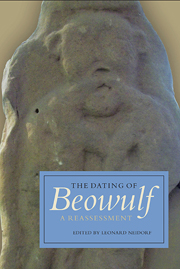Book contents
- Frontmatter
- Contents
- List of Tables
- List of Illustrations
- List of Contributors
- Acknowledgements
- Introduction
- 1 Beowulf and Language History
- 2 Germanic Legend, Scribal Errors, and Cultural Change
- 3 Names in Beowulf and Anglo-Saxon England
- 4 The Limits of Conservative Composition in Old English Poetry
- 5 The Date of Composition of Beowulf and the Evidence of Metrical Evolution
- 6 Beowulf and the Containment of Scyld in the West Saxon Royal Genealogy
- 7 History and Fiction in the Frisian Raid
- 8 ‘Give the People What They Want’: Historiography and Rhetorical History of the Dating of Beowulf Controversy
- 9 A Note on the Other Heorot
- 10 Beowulf and Conversion History
- 11 Material Monsters and Semantic Shifts
- 12 Scandals in Toronto: Kaluza's Law and Transliteration Errors
- 13 Afterword: Beowulf and Everything Else
- Index
1 - Beowulf and Language History
Published online by Cambridge University Press: 05 October 2014
- Frontmatter
- Contents
- List of Tables
- List of Illustrations
- List of Contributors
- Acknowledgements
- Introduction
- 1 Beowulf and Language History
- 2 Germanic Legend, Scribal Errors, and Cultural Change
- 3 Names in Beowulf and Anglo-Saxon England
- 4 The Limits of Conservative Composition in Old English Poetry
- 5 The Date of Composition of Beowulf and the Evidence of Metrical Evolution
- 6 Beowulf and the Containment of Scyld in the West Saxon Royal Genealogy
- 7 History and Fiction in the Frisian Raid
- 8 ‘Give the People What They Want’: Historiography and Rhetorical History of the Dating of Beowulf Controversy
- 9 A Note on the Other Heorot
- 10 Beowulf and Conversion History
- 11 Material Monsters and Semantic Shifts
- 12 Scandals in Toronto: Kaluza's Law and Transliteration Errors
- 13 Afterword: Beowulf and Everything Else
- Index
Summary
It would appear that of the varied types of evidence that have been adduced to try to establish when Beowulf was composed, the linguistic evidence is accorded special status by most Anglo-Saxonists. There are countless signs that this is the case. For example, when Kevin Kiernan sets out to counter the prevailing attitude that the poem could not be a product of the eleventh century, nearly all the evidence he confronts, which he does at some length, is linguistic in nature, the only very notable exception being Dorothy Whitelock's contention that a poem sympathetic to Danes is unlikely to have been composed after the onset of the Viking Age. It is notable how often, in the years following its publication, Ashley Crandell Amos's study rejecting nearly all linguistic bases for dating Old English texts was cited as having produced a revolution. Likewise, Roberta Frank's especial focus upon, and attempt to discredit, those who would date the poem early on linguistic and paleographical grounds is surely a gauge of the seriousness of the challenge that such evidence must be felt to pose to Frank's own ideas about the poem's date.
- Type
- Chapter
- Information
- The Dating of BeowulfA Reassessment, pp. 19 - 36Publisher: Boydell & BrewerPrint publication year: 2014

